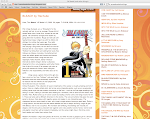 Happily, I actually got a few seconds to scan the New York Times' Sunday Opinion today and had a chance to read a more nuanced view of the situation. I've been thinking a lot about how we need to revolutionize the way we teach reading and novels in high school, and there's plenty of food for thought in writer Lorrie Moore's excellent take on the Twain debate -- and the issue of "the n word" -- "Send Huck Finn to College."
Happily, I actually got a few seconds to scan the New York Times' Sunday Opinion today and had a chance to read a more nuanced view of the situation. I've been thinking a lot about how we need to revolutionize the way we teach reading and novels in high school, and there's plenty of food for thought in writer Lorrie Moore's excellent take on the Twain debate -- and the issue of "the n word" -- "Send Huck Finn to College."Here's an excerpt from Moore's piece:
"There are other books more appropriate for an introduction to serious reading. (“To Kill a Mockingbird,” with its social-class caricatures and racially naïve narrator, is not one of them.) Sherman Alexie’s “Absolutely True Diary of a Part-Time Indian,” which vibrantly speaks to every teenager’s predicament when achievement in life is at odds with the demoralized condition of his peer group, is a welcoming book for boys. There must certainly be others and their titles should be shared. Teachers I meet everywhere are always asking, How can we get boys to read? And the answer is, simply, book by book."
She's speaking as a mother who has, first-hand, experienced the withering impact of giving a child the wrong book at the wrong time. (She seems to have a black son, to whom the novel's language has a special sting -- though the term is used promiscuously in the hip-hop he listens to.)
To read the entire article, click here. Moore, an amazing short story writer, wrote the powerful The Gate at the Stairs, one of the most brutal and beautiful novels that I've read in the past decade.











